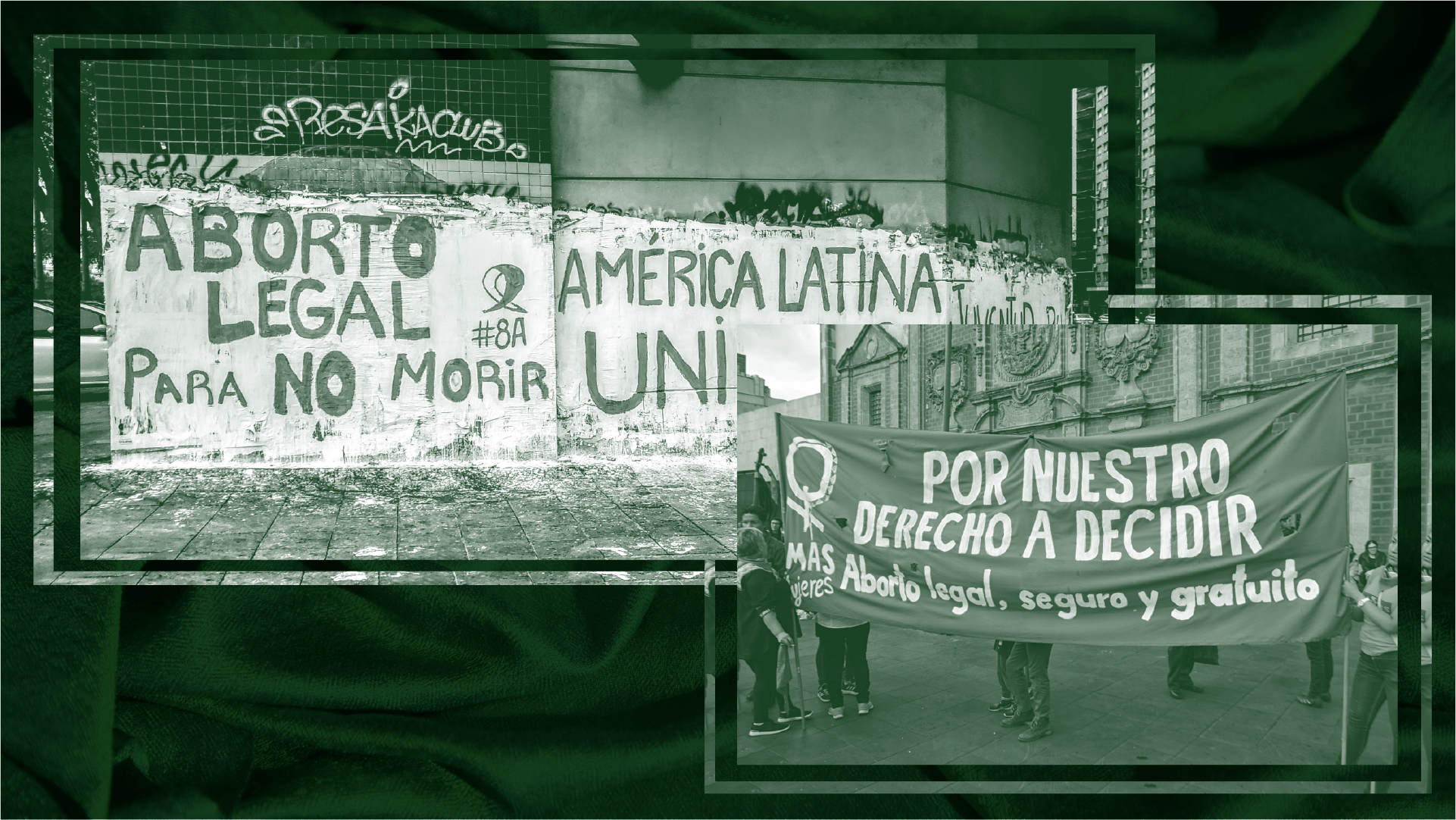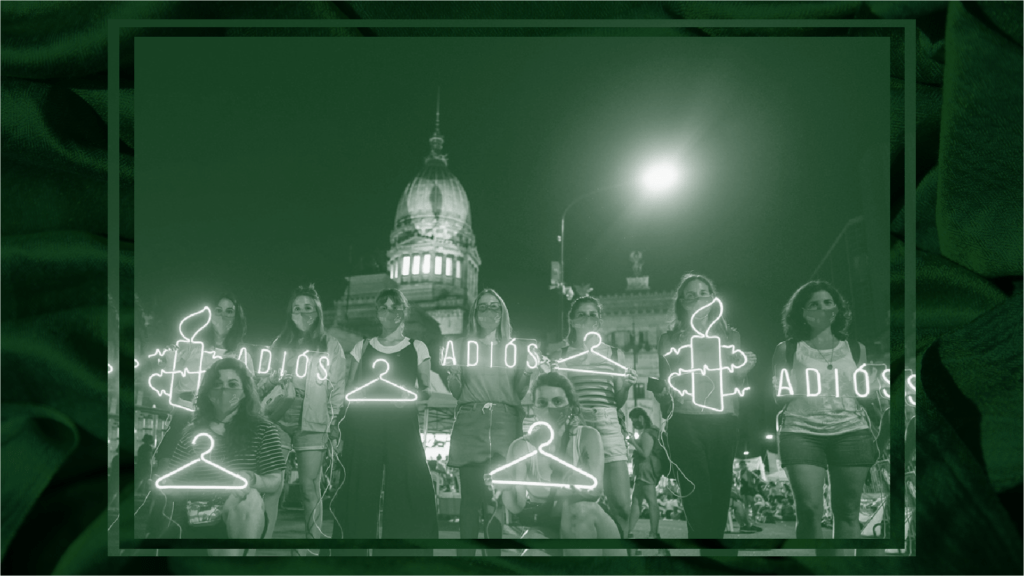
Mexico Legalized Abortion, Strengthening Latin America’s “Green Wave” for Reproductive Rights
The region has a complicated history with abortion legislation and reproductive rights advocacy.
Content Warning: This article discusses miscarriages, violence against women, and abuse.
Green bandanas, posters, and shirts filled the streets of Mexico on September 7 after the nation’s supreme court unanimously ruled abortion is a constitutional right. The color has become a symbol of reproductive freedom in Latin America, with the Green Wave turning the tide once more. Mexico’s historic ruling has paved the way for expanding legal abortion access in one of the most dangerous regions in the world for anyone attempting to end a pregnancy.
I was lucky enough to see the green wave in action while studying in Buenos Aires, Argentina a few years ago. During a time in my undergraduate career where I felt lonely, unsure, and overwhelmed, the work of reproductive rights activists in the region trying to pass comprehensive abortion legislation empowered me. Screams and chants similar to a famous Chilean anti-rape song could be heard across the city. People of all kinds were covered in green and purple paint. Drum circles and dancing took place spontaneously — and all in front of the capitol building. Never had I felt more connected to my people as a first generation Latina, and as an aspiring lawyer who dreams of advocating for Latine communities.
News of Mexico’s ruling came just a week after the future of abortion rights came under siege in the neighboring United States. Texas Governor Greg Abbott signed Senate Bill 8 into law, banning doctors from performing abortions after approximately six weeks, when a “fetal heartbeat” is detected — a scientifically-incorrect term not recognized by the medical community. A beat is created by the heart’s cardiac valves, which do not exist in a six-week-old embryo, according to the American College of Obstetricians and Gynecologists. Regardless, under this law, private citizens can sue doctors or medical practices they believe are performing abortions that violate said law — including anyone who helped make the abortion possible, such as Uber drivers. The U.S. Supreme Court voted 5 – 4 not to block the law on September 1.
In the past few years, reproductive rights have been increasingly at risk in the United States. Lawmakers have proposed more abortion restrictions in 2021 than any other year in U.S. history, according to the Guttmacher Institute. More than 90 bills that would block abortions were introduced during the first half of the year alone. And this December, the future of Roe v. Wade will be decided in a Supreme Court case attempting to overturn the historic ruling.
As clinics in Mexico prepare for an influx of patients who may cross the border from Texas to receive a legal abortion, it’s worth noting that the path to Mexico’s own abortion ruling has not been an easy one.

Photo of abortion rights activists in Buenos Aires by Victor Caivano/AP. Graphic by Maggie Chirdo.
Despite being one of the first countries in Latin America to legalize abortion — under certain circumstances and only in certain cities — Mexican women have been criminalized for being accused of receiving an abortion for years. Between 2009 and 2011, more than 260 women faced incarceration after being accused of seeking an abortion, in some cases by medical providers or neighbors. Several of the accused women said they had actually suffered miscarriages.
To make matters worse, many doctors in the region fear losing their medical licenses or being arrested for performing the procedure. Some not only refuse to perform abortions, but actually report potential patients to authorities simply for seeking help. Some of these patients are accused by their own doctors of purposely inducing a miscarriage without any proof. Others have been handcuffed to hospital beds while still in dire need of medical help. A few lucky patients flee the clinics before health officials are able to apprehend them, according to The New York Times.
Local collectives attempting to advance conversations about reproductive rights are appearing all over Mexico and other countries. But cultural taboos against abortion in most of Latin America compound the danger and stigma.
Although I grew up in a matriarchal household, abortion was something we were not allowed to talk about. Even though I’m a feminist and wrote an entire thesis on abortion and media history in El Salvador, I know better than to mention abortion around older family members — unless I’m in the mood to get into a long-winded argument I’m destined to lose.
Still, cultural norms in Latin America can evolve. Views on abortion in the region are continuously changing. International organizations are fighting for access to sex education across the region. Protests against femicide, violence against women, and in favor of reproductive rights occur often in Mexico, even during the pandemic. But, protesters are almost always brutalized by the state. In March, several activists were beaten violently by police and government officials during a protest on International Women’s Day — a celebration considered of extreme cultural importance in Latin America. A recent report from Amnesty International found that several protestors also faced sexual abuse from officers during other large protests against femicide.
For decades, Mexico has been far more lenient with legal abortions than its neighbors. El Salvador has one of the most restrictive abortion laws in the world; many legislators have gone so far as to charge women who have suffered miscarriages with manslaughter. There are currently at least a dozen women serving life sentences in El Salvador for allegedly inducing a miscarriage. Guatemala and Honduras have similar policies on abortion. Honduras and El Salvador have prohibited abortion under any circumstances — including rape, incest, or threat to the mother’s life — since 1985 and 1998, respectively. The Dominican Republic and Haiti — two of the poorest countries in the region — also ban abortion under any circumstances. Haiti has one of the highest fertility rates in the world.
The illegality of abortion disproportionately affects Latina women, especially those living in poverty. In El Salvador, nearly all of the 16 women currently serving life sentences for having alleged abortions come from the poorest regions of the country. Central American women also face disturbingly high rates of sexual assault, domestic violence, and rape —which affect both their ability to get an abortion and their reasons for wanting the procedure in the first place.

Illustration of a woman holding a “Green Wave” bandana by Maggie Chirdo.
Other Latin American countries have taken a different approach by making great strides towards expanding access to abortion. Last year, Argentina voted to legalize abortion up to 14 weeks of pregnancy, a move which activists had been attempting to pass for decades. In Cuba, abortion has been decriminalized and available for free since 1965. Although conservative lawmakers in Puerto Rico recently threatened abortion rights, any local laws banning abortion are unenforceable due to Roe v. Wade. And in Uruguay, abortion has been legal until the first 12-14 weeks of gestation since 2012.
The shift in legislative and societal attitudes concerning abortion in Latin America has been a long awaited one. Despite most Central American countries celebrating their independence days during Hispanic Heritage Month, many marginalized Latines recognize that legal forces rooted in white supremacy and colonization continue to work against the most vulnerable populations of the region. Catholicism has a stronghold in nearly every country; many lawmakers blatantly intertwine the religion with their political viewpoints. More than 200 Indigenous environmental activists are murdered every year in Latin America for speaking out against harmful legislation. And machismo culture — rooted in patriarchal, colonial ideals — perpetuates the misogyny that leads to high rates of femicide in the region.
While guaranteed legal abortion in Mexico has just begun, the recent ruling offers an example for countries across Latin America. Thousands of people marched in dozens of Latin American countries on September 28 — the Global Day of Action for access to safe and legal abortion — in favor of reproductive rights. In recent years, Central American feminist groups have successfully fought for the release of some of the women incarcerated on abortion murder charges in El Salvador.
The current state of our world makes it difficult to acknowledge the positive change and progress that so many of us continue to work towards — or at least it does for me. But, as a Latina who has long fought for a more inclusive Latin America, I know this ruling signals a brighter future for so many of us. The war may be far from over, but the battle in Mexico is definitely a win.

